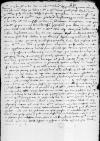Letter #1788
[Ioannes DANTISCUS] to [Jan CHOJEŃSKI]Löbau (Lubawa), 1537-11-16
English register: Dantiscus is replying to two letters from Chojeński. He thanks him for the congratulations. He is very grateful for the king’s letters to the pope and the Cardinal Protector, drawn up in accordance with the previously sent forms. He informs Chojeński that he has received the letters together with copies and is sending them, and the gold as well, through his brother Bernard (von Höfen) and the Fuggers’ bank to the addressees in Rome. Dantiscus asks Chojeński to obtain from the king letters to the pope and the Cardinal Protector on the reduction of his and Giese’s annates. He points out the incompatibility of the amounts, set at the Council of Constance, in relation to the present financial situation of the Chełmno bishop, whose diocese is much poorer than previously as a result of ruinous wars. Dantiscus indicates that when he was taking office as Chełmno bishop, he tried to get the fee reduced, to no avail. He doesn’t want his successor to be treated equally unjustly. He encloses the appropriate sample letters. They will also be delivered with his brother’s help, through Georg Hegel. Bernard has also received instructions on further action with respect to the canonry depending on Chojeński’s decision. Therefore Dantiscus asks him to let him know of that decision. Dantiscus suggests it is time that Prussia was sent the royal mandates concerning taxes. He fears that without these mandates, it will be impossible to start collecting taxes.
Manuscript sources:
Prints:
| ||||||||||||||
Text & apparatus & commentary Plain text Text & commentary Text & apparatus
Reverendissime in Christo Pater et Domine, domine mihi colendissime. Salutem obsequiorumque meorum commendationem plurimam.
cf.
[] Dantiscus is writing about his and Giese’s money for paying the annates. Fees for church benefices – annates – were introduced in 1316 by Pope John XXII. The eneficiary’s formal pledge to pay the annates was the necessary condition of receiving a provision bulla for the new office. Starting from the Council of Constance (1414-1418), annates from higher-ranking benefices were to be paid in two annual installments at the Apostolic Camera in Rome. The amount of annates was specified for every benefice, though information was also gathered about the actual situation of each beneficiary and analyzed at the consistory during which the provision was to be settled, and this is doubtless where Dantiscus saw a chance for reducing the fee (cf. Dudziak; further references there). Applications for a reduction to the fee seem to have been widespread at the time, as shown, for example, by the Polish episcopate’s letters to the pope in 1537 (cf. VMPL, No. DLXXX, DLXXXI, p. 520-523). See also letters cf.
[2 ] The Council of Constance 1414-1418
[3 ] Doubtless Dantiscus is referring to the Polish-Teutonic war – the Thirteen Years’ War (1454-66), and – primarily – to the still quite recent Polish-Teutonic war of 1519-1521, which was ruinous for Prussia (see also cf.
[4 ] After Emperor Charles V took and plundered Rome in 1527 the people of Florence ousted the Medicis from power in their city, but on the basis of the treaty of June 29,1529 the emeror pledged to help the Medicis regain power. In the autumn of 1529 Pope Clement VII began a siege of Florence with the help of an army composed mainly of Spaniards under the command of the prince of Orange. The siege lasted 10 months and ended on August 10, 1530 with the city’s capitulation on the terms offered by the emperor and the pope. Power in the ruined and deserted Florence was taken by Alessandro de Medici (cf. Hibbert,p. 241-243). These events coincided with Dantiscus’ appointment to the office of Chełmno bishop. Dantiscus’ predecessor Jan Konopacki died on April 23,1530, Dantiscus received the papal preconization on August 3, 1530. His ordination (September 14, 1533) was delayed for more than three years because of the diplomatic mission he was on at the time
